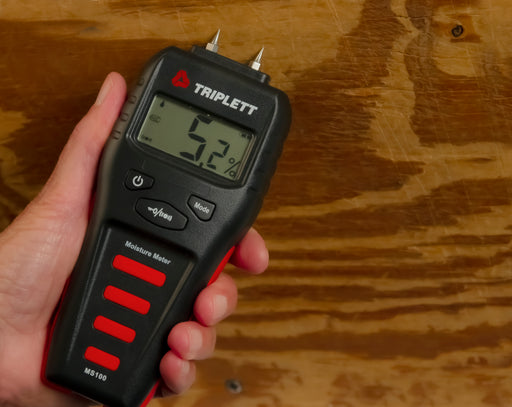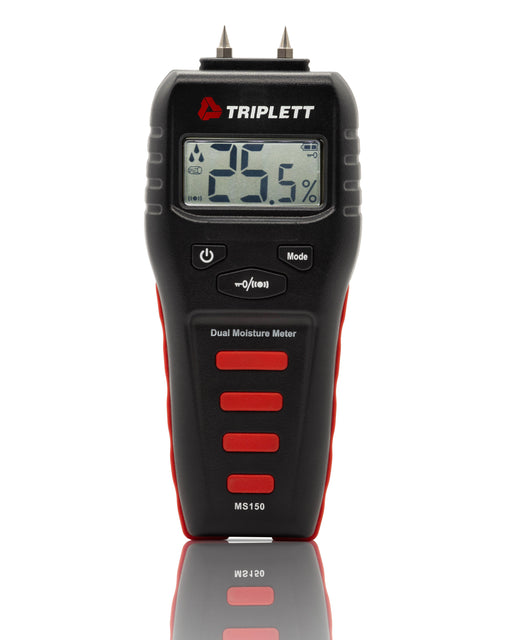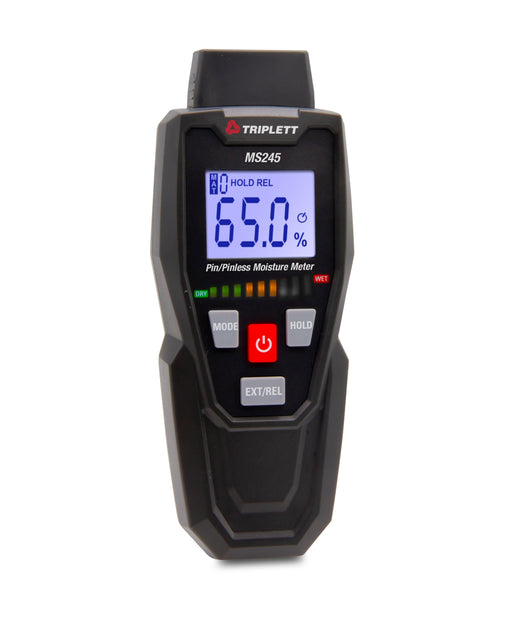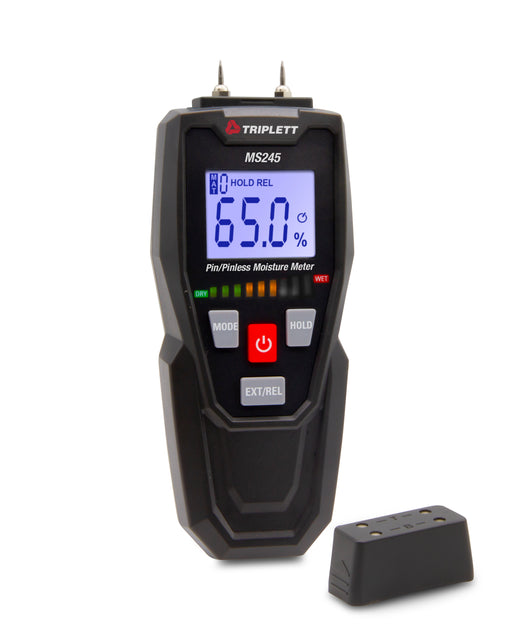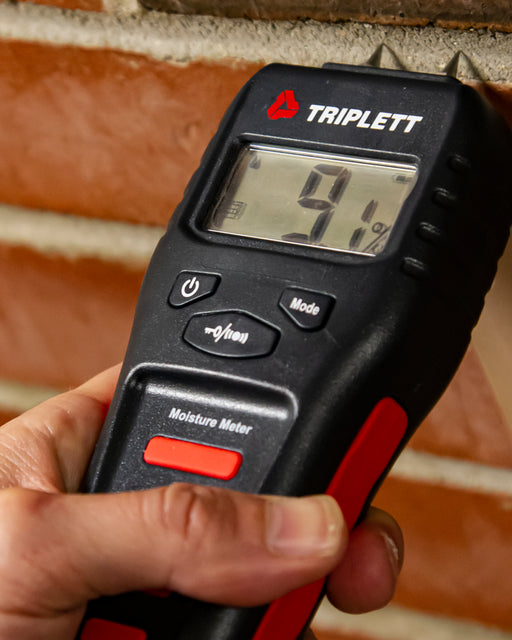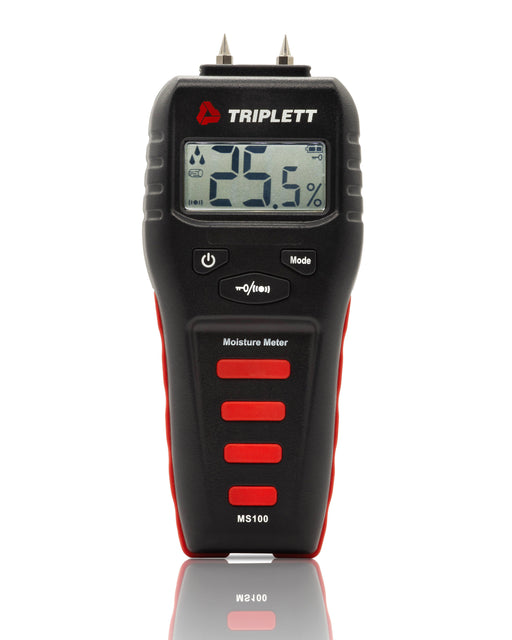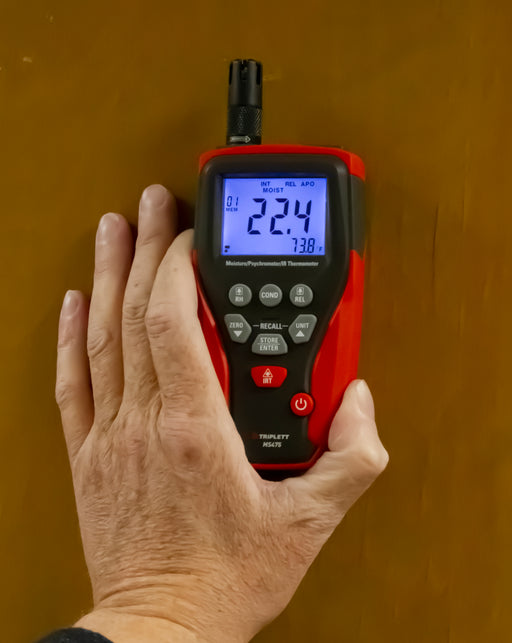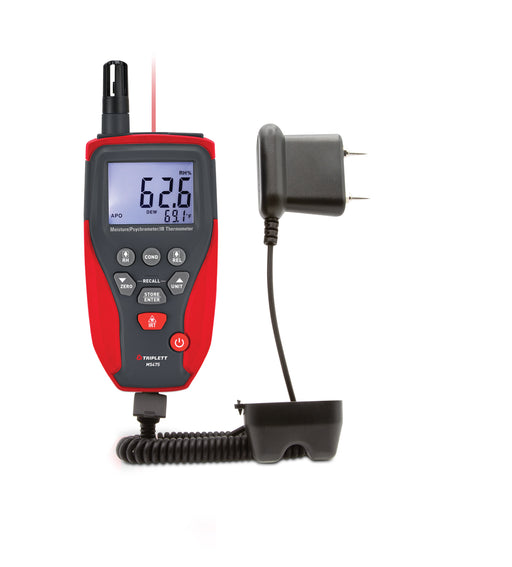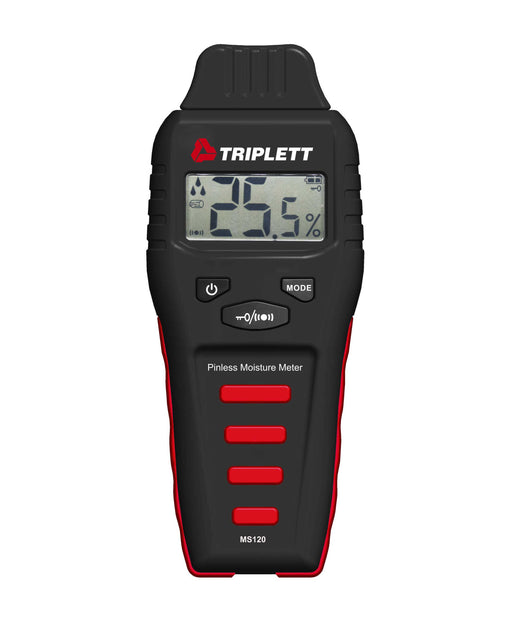Know More About Triplett Concrete Moisture Meter
Benefits of Using Concrete Moisture Tester
The measurement of concrete moisture is essential as moisture content more than a specified limit can lead to several issues, including poor adhesion of coatings or adhesives, mold growth, and degradation of concrete structures. By utilizing our range of moisture meters for concrete floors, professionals can detect potential problems at the earliest and implement necessary steps to mitigate any risks. The following are the other benefits of using these devices.
- Ensures Proper Curing: Monitoring moisture levels is imperative for ensuring a successful curing process. Our range of meters in this category help you to maintain control and monitor moisture levels throughout the entire curing process, guaranteeing that the concrete achieves its desired strength and durability. With the help of these units, you can minimize the risk of cracks, surface defects, and other complications that may arise from improper curing.
- Reduces Project Delays: Moisture-related issues can lead to unexpected delays in construction projects. By using top-notch concrete moisture meters, contractors can identify and address moisture problems at the earliest, reducing the risk of costly delays and rework. This helps projects to stay on schedule and within budget.
- Enhances Quality Control: A concrete moisture reader is a valuable tool that enables contractors to gain accurate moisture measurements, ensuring the quality of the concrete they are working with. By using moisture levels at various points during construction, professionals can make well-informed decisions and implement necessary measures to maintain the desired quality standards.
- Increases Efficiency: Concrete moisture meters eliminate the need for laborious manual testing, allowing contractors to assess multiple locations and areas quickly and accurately. By streamlining the process, these meters significantly enhance project efficiency while saving valuable time and resources.
- Supports Long-Term Durability: Proper moisture management is vital for maintaining the structural integrity of concrete constructions in the long run. Our range of floor moisture testers enables contractors to accurately monitor moisture levels over a period of time, thereby ensuring that the concrete maintains its optimal condition, minimizing premature deterioration.
Major Types of Moisture Meter for Concrete Floors
Moisture meters for concrete floors are available in different types, such as pin-type and pinless meters.
- Pin-type meters demand the insertion of pins into the concrete surface, giving a quantitative reading by measuring resistance between probes.
- Pinless meters use radio frequency signals to penetrate the concrete without causing any damage, thereby measuring moisture content.
How Does a Concrete Moisture Tester Work?
Almost all models of moisture testers employ the principle of electrical resistance to measure the moisture content of concrete. The electrical resistance in a concrete structure is affected by moisture, which acts as a conductor, facilitating the smooth flow of electric current. These devices feature two sharp pins that are carefully inserted into the surface of the concrete. Next, small electrical current is passed through them. The tester measures the resistance between these two probes and converts it into a precise moisture reading, typically displayed as a percentage. This percentage represents the exact proportion of moisture present in the concrete sample being tested. High resistance values would indicate low moisture content and vice versa. The concrete moisture meter must be calibrated before using the device. Results of this concrete moisture meter can be displayed on a digital screen.
Applications of Concrete Moisture Reader
Below are some of the key application areas where concrete moisture testers/meters are commonly used:
- Construction Industry: Concrete moisture testers play a significant role in the construction industry, especially during the concrete mixing and curing process. They are a vital tool in identifying the right timing for applying coatings, adhesives, or floor coverings to prevent potential moisture-related problems in the future.
- Flooring Installations: Flooring contractors and installers largely use floor moisture testers to accurately evaluate the moisture levels in concrete floors prior to installing various flooring materials like tiles, hardwood, laminate, or vinyl. The presence of excessive moisture in the concrete can result in adhesive failure, warping, mold growth, and other detrimental effects on the flooring.
- Restoration and Remediation: Concrete moisture testing plays a vital role in the restoration and remediation industry. By evaluating the impact of water intrusion or moisture issues in buildings, professionals can identify areas with high levels of moisture, which may indicate ongoing leaks, concealed pockets of moisture, or even the potential for mold growth. With this vital information, restoration experts can design effective strategies to dry affected areas, implement necessary remediation measures, and prevent any future damage.
- Concrete Manufacturing: Moisture testing is one of the critical steps in the concrete manufacturing industry. It ensures that the concrete mixtures maintain the appropriate water-to-cement ratio. Controlling the moisture content throughout the production process guarantees the strength, workability, and curing time of concrete. Concrete moisture meters are immensely beneficial in monitoring moisture levels in raw materials, aggregates, and concrete mixtures.
- Research and Quality Control: Scientific research and quality control laboratories use concrete moisture readers to measure and analyze moisture content in concrete specimens. These measurements help in analyzing the behavior and properties of concrete under different moisture conditions, allowing researchers to build innovative construction materials and techniques.
When Should Concrete Moisture Testing be Performed?
There are several circumstances in which concrete moisture testing should be performed to accurately measure the moisture levels in the concrete. Here are some common situations that demand concrete moisture testing.
- Before Installing Finished Flooring: It is recommended to perform moisture testing on the concrete slab before installing any type of finished flooring, like carpet, hardwood, or vinyl. This prevents problems like adhesive failure, buckling, or mold growth that occur due to excessive moisture content. Testing the moisture helps determine if the slab is well prepared for flooring installation, thus eliminating potential problems in the future.
- Prior to Applying Coatings or Sealants: Applying coatings or sealants on concrete surfaces is a common practice to augment durability and aesthetics. However, moisture content on a high level can cause adhesion problems along with premature coating failure. Moisture testing guarantees that the concrete is dry enough to support the application of coatings or sealants.
- During Concrete Curing: Proper curing is imperative to ensure concrete strength and durability. Assessing moisture levels during the curing process helps ensure that the concrete is cured properly and that the water-to-cement ratio is within the required range.
- Prior to Construction: Testing the moisture content of existing concrete is highly recommended before starting any construction on a concrete structure. Excessive moisture levels within the concrete can lead to various issues, like alkali-silica reaction that cause concrete to degrade over time.
- Before Moisture-Sensitive Operations: In specific instances where moisture-sensitive equipment installation or sensitive testing is required, it is crucial to have a dry concrete substrate. To guarantee the effectiveness and accuracy of these operations, moisture testing becomes essential.
- After Water Damage or Flooding: In events such as water damage or flooding, conducting moisture testing in concrete is essential. This helps in measuring the extent of moisture penetration and check if any remediation or drying measures are necessary. This helps prevent future problems like mold growth or structural damage.
Can Concrete Moisture Meters be used on Existing Concrete Structures?
These meters are specifically designed to accurately measure the moisture content of concrete, whether it is freshly poured or has been in place for years. When using a concrete moisture meter on an existing structure, it is crucial to follow a few important steps. Firstly, ensure that the surface of the concrete is thoroughly cleaned and free from any debris or coatings that could potentially impact the meter's readings. Then, firmly position the meter against the surface and take a reading in accordance with the manufacturer's instructions. It is important to remember factors such as the age and condition of the concrete, as well as any applied coatings or treatments, can influence the accuracy of moisture readings. In certain situations, multiple readings may be necessary at various locations to gain a comprehensive understanding of moisture content throughout the entire structure.
Browse More Building, Maintenance & Environmental Collections
Inspection & Laser Distance Meters:
| Industrial Borescope Camera | Photo & Contact Tachometers |
| Manometers | Laser Distance Meters |
Gas Meters:
| Natural Gas Detector and Pen | Formaldahyde Meters | Co & Co2 Meters |
Environmental Meters:
| Sound & Noise Level Meters | Hygro-Thermometers | Non-Contact & Contact Thermometers |
| Handheld Particle Counters | Humidity Indicators & Meters | Light Intensity Meters |
| Vane Anemometers | Digital Hygrometer |
Water Quality:
| PH and Conductivity Meters |



